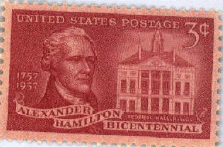FRtR > Outlines > American Economy (1991) > Foreign Trade and Global Economic Policies > From protection to liberalized trade
An Outline of the American Economy (1991)
10/12 Foreign Trade and Global Economic Policies
2/7 From protection to liberalized trade
*** Index * < Previous * Next > ***
Historically, however, the United States has from time to time
experienced a strong impulse toward economic protectionism -- the
practice of using tariffs or quotas to limit imports of foreign
goods in the interest of protecting native industry.
 At the
beginning of the republic, statesman
Alexander Hamilton advocated a
protective tariff as a way to encourage American industrial
development. By and large his advice was adopted. Throughout the
1800s, domestic political considerations, including the desire to
expand exports of such important commodities as cotton,
determined U.S. trade policy.
At the
beginning of the republic, statesman
Alexander Hamilton advocated a
protective tariff as a way to encourage American industrial
development. By and large his advice was adopted. Throughout the
1800s, domestic political considerations, including the desire to
expand exports of such important commodities as cotton,
determined U.S. trade policy.
U.S. protectionism peaked in 1930 with the enactment of the
Smoot-Hawley Act, a tariff law which intensified the effects of
the Great Depression. Smoot-Hawley sharply
increased U.S. tariffs and quickly met with foreign retaliation. The act contributed to
the world economic crisis.
The U.S. approach to trade policy since 1934 has been a direct
outgrowth of this experience, and following World War II,
the United States endorsed trade liberalization. Many U.S. leaders
argued that the domestic stability and continuing loyalty of U.S.
allies would depend on economic recovery. U.S. aid was important
to this recovery, but these nations needed export markets --
particularly the huge U.S. market -- in order to regain economic
independence and achieve economic growth.
Secretary of State Cordell Hull understood this connection long
before World War II. He wrote in support of the Trade Agreements
Act of 1934, which provided the basic legislative mandate to cut
U.S. tariffs:
"Nations cannot produce on a level to sustain their people and
well-being unless they have reasonable opportunities to trade
with one another. The principles underlying the Trade Agreements
Program are therefore an indispensable cornerstone for the
edifice of peace."
The Reciprocal Trade Agreements Act of 1934 gave the president
the authority to negotiate trade agreements with individual
countries, and greatly reduced duties on their exports to the
United States in return for similar concessions on U.S. exports
to their countries.
U.S. support for liberalizing trade was instrumental in creation
of the General Agreement on Tariffs and Trade (GATT), an
international code of tariff and trade rules that was signed by
23 countries in 1947 and represented over 90 countries by the end
of the 1980s. In addition to setting codes of conduct for
international trade, GATT has sponsored several rounds of
multilateral trade negotiations, and the United States
participated actively in each of them, often taking a leadership
role.
*** Index * < Previous * Next > ***
 At the
beginning of the republic, statesman
Alexander Hamilton advocated a
protective tariff as a way to encourage American industrial
development. By and large his advice was adopted. Throughout the
1800s, domestic political considerations, including the desire to
expand exports of such important commodities as cotton,
determined U.S. trade policy.
At the
beginning of the republic, statesman
Alexander Hamilton advocated a
protective tariff as a way to encourage American industrial
development. By and large his advice was adopted. Throughout the
1800s, domestic political considerations, including the desire to
expand exports of such important commodities as cotton,
determined U.S. trade policy.